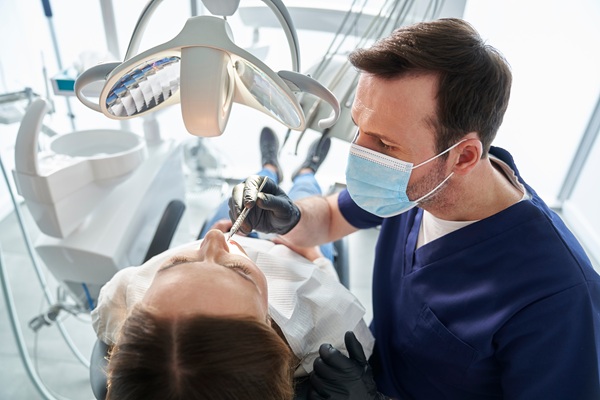How Often Should You Get a Teeth Cleaning?

Whether you are a person who loves to care for your teeth and gums or someone who has been neglectful due to various circumstances, routine teeth cleaning is essential to your oral health. The following article will review everything you need about professional teeth cleanings, such as why they are necessary, what to expect, and how to properly care for your teeth at home.
Why professional teeth cleanings are necessary
Professional teeth cleanings are essential to keeping a patient’s smile healthy and bright. As a general rule, the American Dental Association recommends that everyone, regardless of age, get a professional teeth cleaning twice a year (every six months). These routine visits will help the dentist uncover any problems that may have developed since the patient’s last visit and prevent them from worsening. If the dentist notices a patient experiencing dental conditions, such as periodontal disease or tooth decay, during their standard cleaning, they may recommend more frequent visits as part of their treatment plan. However, if the patient’s oral state is normal, most dentists can complete their cleaning appointment in as little as 30 minutes.
What to expect during professional teeth cleanings
The duration of the first appointment will depend on the following factors: how long it has been since the last appointment if X-rays are needed, and the patient’s age. For example, if the patient has never visited our practice before, our team will review their dental history, take X-rays, and perform a physical examination before beginning the cleaning. Thorough exams and imaging tests will help give our dentist a better view of the true state of the patient’s oral health.
If there are no signs of decay or gum disease, our dental hygienist or dentist will use special tools to clean the patient’s teeth, also known as scaling and root planing. A professional teeth cleaning aims to remove plaque, tartar, and stains from the surfaces and between teeth.
Plaque is a sticky deposit that can form on the teeth after eating or drinking anything containing sugar (including fruit), starches, or carbohydrates. Tartar forms when plaque is left alone for as little as 48 hours. It makes it easier for bacteria to grow inside the patient’s mouth, causing periodontal (gum) disease or tooth decay. Meanwhile, stains can come from drinking colored drinks, such as juice, soda, coffee, or tea. They can also appear from smoking cigarettes or eating certain fruits (berries).
We will use a special dental paste to polish the patient’s teeth before applying a fluoride treatment. The fluoride treatment is an added layer of protection against cavities. It can also help relieve sensitive teeth.
Caring for the teeth in between cleanings
Patients must be diligent with their oral care at home. Often, patients slack off with certain actions, such as flossing, because they think it is unnecessary to do it every day. However, this is untrue.
To maintain optimal oral health, patients must brush their teeth, ideally with fluoride toothpaste, at least twice daily to prevent plaque buildup and bacteria. In addition, they should floss or use devices, such as a water pick, at least once daily, preferably before bedtime. Using mouthwash after brushing and flossing can help rid the mouth of stubborn bacteria.
Schedule your next appointment today
Routine dental cleanings are just as important as at-home care to ensure optimal oral health. To schedule a cleaning appointment for you or a family member, contact our Santa Clarita office at (661) 425-0008. We look forward to seeing you.
Request an appointment here: https://www.whitecrowndental.com or call White Crown Dental at (661) 425-0008 for an appointment in our Santa Clarita office.
Check out what others are saying about our dental services on Yelp: Teeth Cleaning in Santa Clarita, CA.
Related Posts
A preventive dentist can protect your mouth from different ailments. This dental care professional can perform treatments that can keep your teeth and gums healthy. Regular visits can ward off serious dental problems later on. Here are the details about visiting a preventive dentist for good oral health.The main goal of this field is to…
While patients can receive the immediate care they need during a dental emergency, they may still struggle with stress and some pain following the appointment. Thus, you need to follow specific guidelines from the emergency dentist to boost your recovery. One of the most important aspects is following specific dietary restrictions to prevent potential complications…
Dental implants are excellent options for restoring dental function and aesthetics in patients with missing teeth. However, the process does not end after the implant placement. The long-term condition of your mouth determines the success of the treatment. If you want to maintain good oral health and thus, your implants, this article explores a few…
Keeping your appointments with your family dentist can help keep your mouth healthy. This dental health professional knows how to relax and calm patients of every age. Knowing your dentist’s abilities can give you peace of mind that you are in good hands. Here are the details on how your family dentist can improve your…
